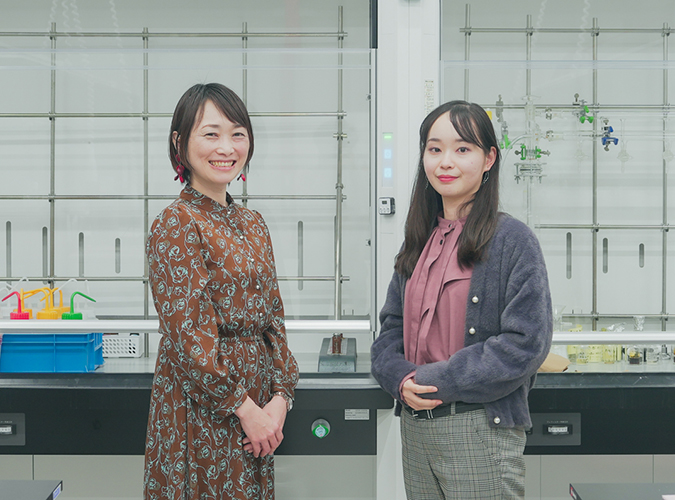150周年記念企画
「未来を拓く青学マインド」
青学発、未来を創る挑戦者。社会を変えるビジネス
|校友・卒業生|
LINEヤフー株式会社
代表取締役会長
川邊 健太郎
×
国際マネジメント研究科
国際マネジメント専攻
(青山ビジネススクール:ABS)2年
青山ビジネスプランコンテスト
起業部門優勝チーム
「CyclingConcierge」
福井 洋/松尾 修作
/山口 章平/瀨戸 寿夫
青山学院は2024年、創立150周年を迎えました。自由で文化的な校風のもと、青山学院で学んだ卒業生たちは、自らの発想を広げ、時代を牽引する存在として各界で活躍しています。青山学院大学在学中に起業し、現在LINEヤフー株式会社のトップを務める川邊健太郎会長も、その一人です。今回は、青山ビジネススクール(ABS)で学ぶ社会人大学院生の中から、青山ビジネスプランコンテストで優勝したチームのメンバーが、同コンテストの審査員を務めた川邊会長を訪ねました。学生時代の経験がキャリアに与えた影響や、社会を変えるビジネスを生み出すマインドについて、お話を伺いました。
Profile
LINEヤフー株式会社 代表取締役会長
川邊 健太郎
1998年 法学部 法学科 卒業


初等部から大学まで青山学院で学ぶ。1995年、大学在学中の21歳で学内の仲間とともに「電脳隊」を設立し、学生IT起業家としてキャリアをスタート。2000年、25歳で会社をヤフーと合併する形で売却し、ヤフー株式会社に入社。「Yahoo!モバイル」「Yahoo!ニュース」などの事業を統括し、2018年、43歳でヤフー代表取締役社長兼CEOに就任。経営トップとして組織を率い、Zホールディングス代表取締役社長を経て、2023年10月よりLINEヤフー株式会社代表取締役会長を務める。日本のIT業界の発展とデジタル社会の進化に尽力し、社会貢献活動にも力を注ぐ。一般社団法人日本IT団体連盟会長。

国際マネジメント研究科
国際マネジメント専攻(ABS:青山ビジネススクール)2年
青山ビジネスプランコンテスト起業部門優勝チーム「CyclingConcierge」
福井 洋/松尾 修作/山口 章平/瀨戸 寿夫
ABSの実践型プログラム「青山アクション・ラーニング」を通じてビジネスプランの設計を学んだ同期4人が、訪日観光客向けのサイクル・ツーリズムを提案するマッチングサービスの展開を目指し、「CyclingConcierge」を結成。メンバーは写真左から、鉄道系デベロッパー勤務の福井、サイクリストでユーチューバーの松尾、インフラ系コンサルタントの山口、ファイナンスを専門とする瀨戸。それぞれの異なる経験や専門性を生かしてビジネスモデルを構築。2024年の青山ビジネスプランコンテストでは、地域活性化にも貢献する訪日観光客向けサイクル・ツーリズムをワンストップで提供する事業プランを提案し、起業部門で優勝を果たした。
TALK THEME
1st TALK
私たちの
ビジネスプランのこれから
ターゲットを
「4万人から400万人へ」
という明確な成長戦略を


山口さん
私たちが青山ビジネスプランコンテストで提案したのは、台湾からの観光客をターゲットにした、サイクル・ツーリズムのワンストップ・サービスです。近年、アジアを中心に少人数のグループが1~2週間かけて地域を自転車で巡るサイクル・ツーリズムが人気を集めています。しかし、日本国内では行政の施策や自転車関連の事業者がこのニーズに十分対応できていません。このミスマッチを解消し、地域活性化を促進するため、ポータルサイトを活用した情報発信、周遊ルートの開発、ツアーサポートを事業の柱とするプランを提案しました。コンテストの賞金100万円を資本金の一部に充て、会社設立を目指しています。川邊さんは、私たちのビジネスプランについてどのような感想をお持ちでしょうか?
ターゲットとする「自転車を持参し、1~2週間かけて日本を周遊するアジア人観光客」の実際の人数はどれくらいいるのでしょうか?

川邊さん

山口さん
現在、年間2万人ほどと見ています。5年後には4万人に拡大すると想定しています。
なるほど。現状も将来も規模は少ない、かなりニッチですね。コンテストでは概念や地方活性化の視点が評価されましたが、これから問われるのは、具体的に数字を弾いた裏付けです。たとえば「自分たちのビジネスで4万人を400万人に拡大します」といった明確な成長戦略が示せれば、投資家を納得させられる。ほかのニッチなツーリズムの成功例を参考にしながら、説得力のあるビジョンを描けると良いでしょうね。

川邊さん

松尾さん
なるほど。地域活性化やSDGsに貢献するビジネスモデルを模索する私たちに対し、どのような企業や投資家が興味を持っていただけそうでしょうか?
地方創生や地域活性化は、日本の歴代政権が推進してきたテーマで、特に現政権はその思いが強い。確実にトレンドは来ています。すでに地域活性化を支援するファンドも多く存在していので、そこには積極的にプレゼンするべきでしょうね。地方銀行は地域活性化の関心が高いので、主体的に関与してくれる可能性が高いでしょう。

川邊さん

松尾さん
いずれは国や自治体との連携も必要になると考えています。川邉さんは政府の規制改革推進会議の委員も務めていらっしゃいますが、行政を巻き込むための方法やコツについて、ご意見をいただけますか?
みなさんの場合、すでにインバウンド向けのサイクル・ツーリズムという確固たるテーマがあるので、「ここならコンテンツ化できる」と思う市町村に、まず個別にプランを持ち込むのが良いと思います。その中で、手ごたえのある自治体と実績をつくり、それを持って省庁に提案すると、話に乗ってもらえる可能性が出てくるような気がしますね。省庁や自治体も、良い提案であれば前向きに話を聞いてくれる土壌はあると思いますよ。

川邊さん

松尾さん
ありがとうございます。今後、さらに掘り下げて検討していきたいと思います。
2nd TALK
世の中を変えるビジネスを
どう生み出す?
10年後に何が当たり前になるかを
考え、
自分を信じて迷わす突き進む

川邊さんが在学中に「電脳隊」を起業されたとき、どのような目的で、社会にどのような価値を創造しようと考えていたのでしょうか?

松尾さん

川邊さん
最初から大きな理念があったわけではなく、「インターネットという新しい技術を使って何かやってみたい」という純粋なパッションに突き動かされた、というのが正直なところです。ただ、後から振り返ると、当時はインターネットがあっても実際に使える人が少なかった。だから、とにかくパソコンとインターネットをつなげること自体が、社会的な意義であり、ミッションだった、と言えますね。
今では当たり前の存在となったインターネットですが、当時はどのようなものでしたか?

松尾さん

川邊さん
当時、そういう言葉はありませんでしたが、インターネットは「情報の非対称性を解消する技術」であり「メディアの民主化を実現できる技術」でした。情報の非対称性という意味では、たとえば「Yahoo!オークション」の登場が象徴的です。それまで売り手が決めていたモノの値段を、買い手が左右できるようになった。メディアの民主化という点では、今やブログやSNSでの個人の発信が、マスメディア以上の影響力を持つこともあります。インターネットが登場する前には考えられなかったことで、私はそこに深いパッションを感じました。
そうした強いパッションを持って創業した会社をヤフー株式会社(以下ヤフー)に売却し、ヤフーに入社されました。入社後は、どのようなモチベーションを持ってキャリアを築いていったのでしょうか?

松尾さん

川邊さん
私の場合、一貫して「インターネットで何かサービスを提供することが楽しい」という思いがモチベーションになっています。ヤフーは、日本で最もインターネットサービスをつくりやすい環境が整っていて、提供したサービスに対するユーザーの反応も一番ダイレクトに返ってくる場所でした。だから、サービスをつくることが面白くて、夢中になって仕事をしていました。
川邊さんはこれまで、世の中に変化をもたらすビジネスを数多く立ち上げてこられました。社会に変革を生み出すために、ご自身が意識されていることはありますか。

福井さん

川邊さん
まずは技術を軸に据えて、その技術が社会にどのような影響を与え、10年後に何が当たり前になっているのかを常に考えることですね。その上で、「10年後は今とまったく違う社会になる」と確信したら、一刻も早く組織や事業をそちらにコンバートする。自分の考えを信じて、迷わず突き進む。それが世の中を変える一つの方法だと思っています。
私も、最初はパソコンのインターネット環境にパッションを感じて仕事をしていました。しかし、あるときアメリカのシリコンバレーで「モバイル(携帯電話)のインターネット市場の方が大きくなるだろう」という話を耳にしました。帰国して検証すると、確かにその兆しがあった。そこで、すぐにモバイル分野に仕事をシフトしました。当時はまだガラケーの時代で「こんなに小さい画面でインターネットなんて」と言われましたが、結果的にすべてがモバイルに変わりましたよね。
「10年後はこう変わる」と考えても、それを具体的なビジネスプランに落とし込むのは難しいものです。アイデアをうまくビジネスにつなげるために、川邊さんはどのようなアプローチをされているのでしょうか?

福井さん

川邊さん
それはもう「ネットでやってみる」に尽きます。今はSNSを使えばマーケティングも手軽にできますし、作ったものを直接ユーザーに届けてダイレクトな反応を得ることができます。先ほどみなさんのビジネスプランに対して数字の話をしましたが、精度を上げる際も、頭の中だけで考えるより、ネット上で実際に試してみた方が圧倒的に早い。小さな実験を繰り返しながらデータを集め、リアルな市場感覚をつかんだ方が良いです。今はすでにグローバルプラットフォームが整っているので、それを活用することが成功への近道になると思います。
ありがとうございます。これから私たちがビジネスを展開していく中で、事業の転換が必要になる場面も出てくると思います。事業や組織、さらには社会において「厳格さ」と「柔軟性」のバランスをどのように取るべきか、川邊さんはどのように考えていますか?

福井さん

川邊さん
電脳隊の時に仲間で決めたのは、「やらないこと」だけでした。やらないと決めたこと以外は、何をやっても良い。そうすることで、組織に柔軟性が生まれます。逆に「やること」を決めるのはとても難しい。だからこそ、「ここには手を出さない」と明確に線引きをすることが大事だと思います。
3rd TALK
「これからの青学に期待することは?」
「いかがわしいこと」に対して、
自分の尺度だけでダメ出しをしない

私は高等部から青山学院で学び、青学が大好きで、社会人大学院生として再び母校に戻ってきました。川邊さんは初等部から青学で学ばれていますが、本学での思い出をお聞かせいただけますか?

瀨戸さん

川邊さん
とても自由に個性を尊重してもらえたことに感謝しています。内部生なので大学までいわゆる受験がなく、面白いものを考えたり、つくったりする時間がたくさんありました。進学の節目で、外部から成績優秀な生徒・学生が入ってくるので、彼らと友達になって刺激を受け、また新しいことに挑戦できる。文化的だし、面白いことができる雰囲気がものすごくあったと思います。一方で、「今は感謝しているけど、当時は……」という思い出もありますよ。
どのような思い出ですか?

瀨戸さん

川邊さん
一つは、高等部3年次の文化祭で「青山サンバ隊」企画の実施を止められたことですね。気の合う仲間たちとサンバ隊をつくって、演奏したり、踊ったりし、観客を巻き込んで構内を練り歩いたのですが、事前申請なく無許可だったので、途中で先生に止められてしまいました。でもその夜、仲間の皆で代々木公園に集まって、もう一度サンバを踊ったのです。すると、後輩たちが「参加して良かった」「面白かった、ありがとう」と言ってくれて、そのときに初めて、「人を束ねて何かをプロデュースする楽しさ」に目覚めました。学校では止められたけれど、粘って代々木公園で自由にやり切った。そこで仲間から最高の評価を得られた。この経験が、私がインターネットのような自由な世界を好むようになった原点かもしれません。
それと似たようなことは、大学時代にもありました。起業した電脳隊のサービスの一つに、いくつかのパーソナルデータを入力するだけで簡単に個人のホームページを作成できるものがありました。当時の厚木キャンパスの学生食堂にパソコンを持ち込んで、そのデモをやっていたのです。そこに職員の方が来て、「誰か大学の許可を得ているのですか」と言いながら、突然パソコンの電源プラグが抜かれてしまい、保存していなかったデータは吹き飛びました。
そんなことがあったのですね……。

瀨戸さん

川邊さん
25年前の話ですがね。インターネットという新しいことをやっていたので、サンバ隊以上に怪しいというか、『いかがわしいこと』に見えたのでしょう。そのときは何て理不尽だろうと思ったし、大学の枠組みの中でやっていても限界がある、外の世界に出ていこうと決意するきっかけになりました。事を起こす際に事前に許可を得るという大切さも痛感したので、今では、その職員の方に感謝しています。当時は嫌な思いをしましたが、逆境があった方が人は成長するのかもしれないですね。
青山学院のスクール・モットー「地の塩、世の光」やそれを体現するサーバント・リーダー*、青学マインドとはどのようなものだと思いますか?
*自分の使命を見出して進んで人と社会とに仕え、その生き方を導きとする人。

瀨戸さん

川邊さん
青学マインドについては、大きく2つあると思っています。一つは、先ほどもお話した「校風」ですね。青山キャンパスは青山・渋谷エリアという立地にあり、内部生には自由な時間があり、文化的な人も多い。そうした環境の中で、先端的な雰囲気や個性を尊重する独特のマインドが育まれているのが青学の大きな特長だと思います。
もう一つは、キリスト教の考え方です。私が特に印象に残っているのは、「求めなさい。そうすれば、与えられる」(マタイによる福音書
7章7節)や「苦難が忍耐を生み、忍耐が品格を、品格が希望を生む」(ローマの信徒への手紙
5章3節~4節)という聖書の言葉です。こうした言葉を繰り返し耳にし、理解していたから、逆境を乗り越え、ここまで頑張ることができた。聖書には、努力して成功しようとする人の支えになる言葉がたくさんあり、それが自分の血肉になっている感覚があります。
そうした教えに支えられて努力し、成功すると、「自分の力だけで成し遂げたわけではなく、さまざまなものに助けられて今がある」と実感し、感謝する気持ちが生まれてきます。そこから初めて「地の塩、世の光」や「サーバント・リーダーとして生きる」という意識が芽生えるのではないでしょうか。
では、今の青学生に向けて、学生時代にやっておくべきことのアドバイスやメッセージをお願いします。

松尾さん

川邊さん
AIの時代だからこそ、何かに夢中になる経験をたくさんしてほしいと思います。テキスト生成AIを使ってみると分かるように、大学で平均点を取れるくらいの無難なレポートなら、もうAIが書ける時代です。つまり、これから大事なのは、AIでもできる無難な答えを出す能力ではなく、「この人にしか考えつかないよね」という独自の視点を持つこと。その視点を身に付けるには、夢中になって何かに取り組むしかない。AIには「夢中になる」という概念はありませんから。
それに関連してもう一つ、大切なのは人とのつながりをつくることです。AIがどれだけ発達しても、人間同士がつながり、協力して何かを生み出すことの価値は変わりません。利害関係を超えた親友をつくることも大事だし、関係は浅くても、互いに刺激を与え合える人とつながることも将来の財産になります。学生時代に多くの人と関わり、視野を広げる経験を大切にしてほしいですね。
川邊さんは読書家としても知られていますが、夢中になれることを見つけるために、本をどのように活用すればよいでしょうか?

松尾さん

川邊さん
夢中になることが見つからない人には、本をたくさん読むことで新しい発見があるかもしれませんね。その場合、とにかく数多く読んだ方が良いと思います。先生や家族が勧める本、SNSでフォローしている人が面白いと言っている本、レビューの評価が高い本など、何でも良いので手に取ってみる。面白いかどうか分からなくても、とにかくたくさん読んでみてください。オーディオブックを聴くのもおすすめです。
川邊さんがこれからの青山学院に期待すること、また青山学院が社会において担うべき役割について、どのようにお考えかお聞かせください。

松尾さん

川邊さん
期待するのは、「『いかがわしいもの』に対して、自分の価値観や尺度だけで電源プラグを抜かない」ということですね。私が尊敬するソフトバンクグループ代表取締役会長兼社長執行役員の孫正義さんは『いかがわしくあれ』をモットーにしていて、その結果、これだけの企業グループを築き上げました。学生が何だかよくわからないことをしていたら、むしろ一度しっかり話を聞いてみる。そして、それが本質的に正しく、未来の価値を生み出す可能性があるようなことなら、ぜひサポーティブであってほしいと思います。
人とのつながりの重要性についてお話いただきましたが、私たちもこれから仲間を増やし、ビジネスの実現に向けて取り組んでいきたいと考えています。仲間はどのように探し、見つけていけばいいのでしょうか?

山口さん

川邊さん
とにかくもう「SNSで叫べ」ですね。それから、何を叫ぶかをしっかり考えることが大事です。AIが考えたような無難な内容を叫んでも、そのうち相手にされなくなります。大事なのは、「この人、なんだかすごく人間くさいな」「この人、面白そうだな」と思ってもらえることを考えて、叫ぶ。
私の学生時代とは違って、今はSNSで発信すれば、誰かとつながれる時代です。本当にうらやましいですよ。みなさんのビジネスも、とても意義のあるものだからこそ、それを分かりやすく、そして人間味を込めて叫び続けてほしいですね。
はい、パッションを持って挑戦し続けたいと思います。本日は貴重なお話をありがとうございました。




一同


After Interview
起業という目標に向かう「CyclingConcierge」のメンバーが、川邊さんのお話から得たヒントは?

「プラグを抜かないで」という言葉がありましたが、川邊さんご自身が私たちの質問を一切否定せず、丁寧にお答えいただいたことがとても印象的でした。新しい芽をどう育てていくかという視点で接してくださり、その姿勢に勇気をいただくとともに、サーバント・リーダーとしての在り方を感じ取ることができました。また、川邊さんの根底にはキリスト教の考えがあるというお話を伺い、確たる信念を持つことの大切さを改めて学ぶことができました。ABSでは「ビジネス倫理」が必修である他、「文化と宗教から見るビジネスと倫理」といった授業があります。一見、ビジネスとは直接関係がないように思える学びですが、経営者にとって重要な意味を持つことを再確認できました。フレンドリーな雰囲気の中でわかりやすくお話ししてくださったことに、心から感謝いたします。























